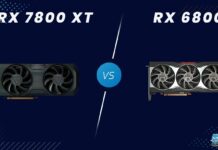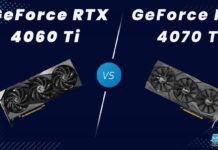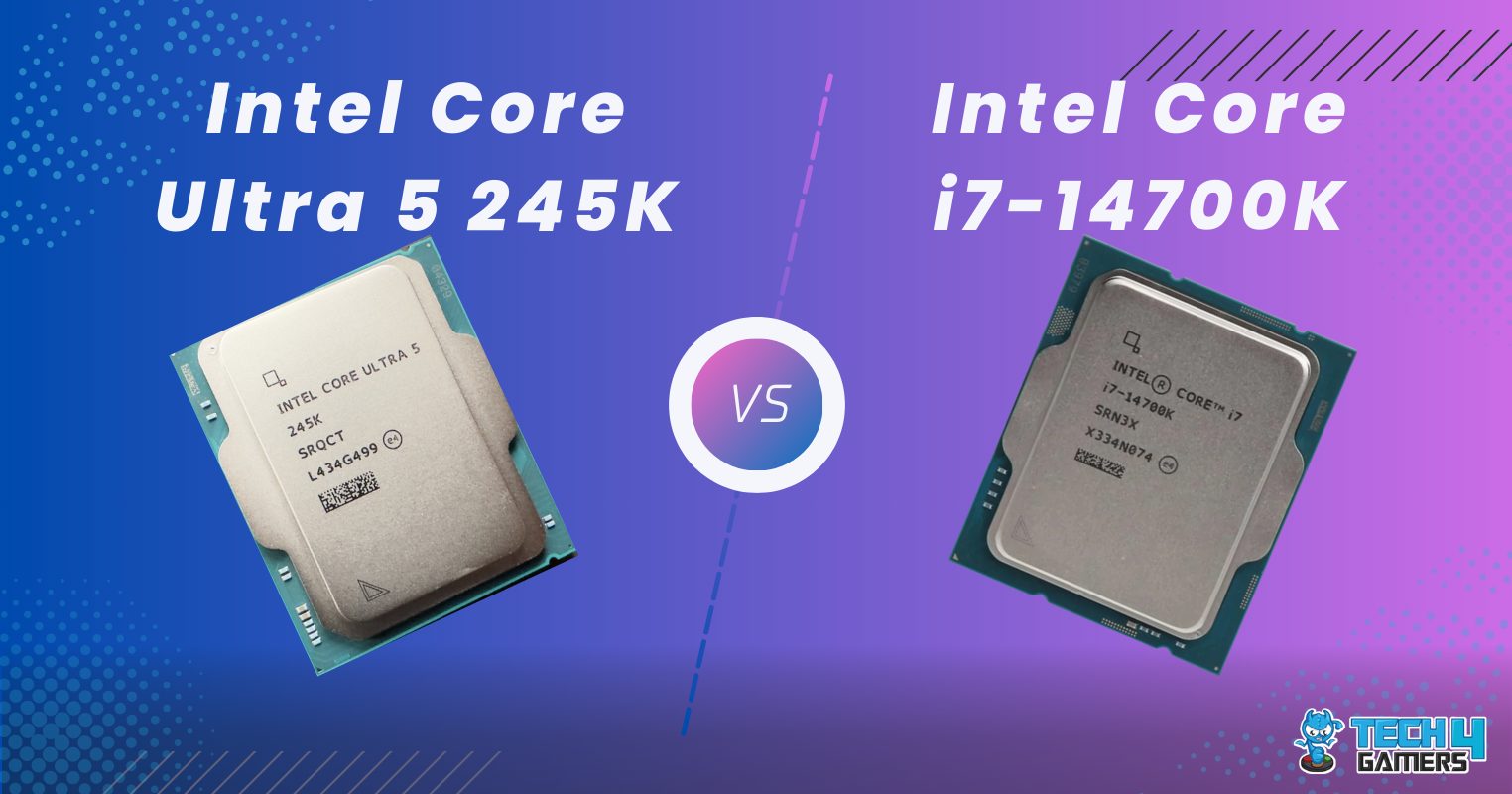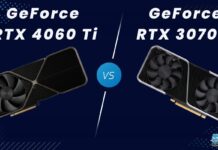The Core i9-9900K was one of the fastest CPUs to utilize Intel’s Coffee Lake architecture. On the other hand, the Core i5-12600K is a mid-range beast employing Intel’s Hybrid Core design. In this article, I’ll analyze whether this mid-range CPU is powerful enough to beat the fastest 9th-generation CPU in Core i5-12600K vs Core i9-9900K.
Key Takeaways
- The i5-12600K uses Intel’s 10nm node (called Intel 7), while the i9-9900K is built on Intel’s 14nm process.
- In my 1080P gaming benchmarks, the Core i5-12600K outperformed the Core i9-9900K by 6.4%.
- Power consumption favored the Core i5-12600K in 1080P gaming (by 7.3%), while the Core i9-9900K ran 8.5% warmer than Core i5-12600K during said tests.
- The Core i5-12600K provides stellar value compared to the Core i9-9900K, as it’s about 33.9% cheaper and performs better in 1080P gaming.
| CPU | Core i5-12600K | Core i9-9900K |
|---|---|---|
| Architecture | Hybrid Core | Hybrid Core |
| Codename | Alder Lake-S | Coffee Lake-R |
| CPU Socket | LGA1700 | LGA1151 |
| Unlocked for Overclocking | Yes | Yes |
| Integrated Graphics | Intel UHD 770 | Intel UHD 630 |
| Max. Operating Temperature | 100°C | 100°C |
| Die Size | 215mm² | 180.3mm² |
| L1 Cache |
|
64KB per core |
| L2 Cache |
|
256KB per core |
| PCIe Support | PCIe Gen 4, 5 | PCIe Gen 3 |
| Release Date | Nov 4th, 2021 | Oct 19th, 2018 |
| Launch MSRP | $289 | $488 |
| Best CPU Coolers | Best CPU Coolers For Core i5-12600K | – |
| Best Motherboards | Best Motherboards For Core i5-12600K | – |
| Best Memory | Best RAM For Core i5-12600K | – |
Architectural Differences
- Manufacturing Process: The Core i5-12600K is built on the Intel 7 (10nm) process compared to the i9-9900K, which is built on a 14nm process from Intel.
- Core/Thread Counts: Intel’s Core i5-12600K sports 10 cores (with six P-cores and four E-cores). In contrast, the Core i9-9900K has eight full-power cores. Regarding the thread counts, the Core i5-12600K has 18, while its Core i9 competitor has 16.
- Clock Speeds: When it comes to the full-power cores, the i5-12600K clocks 3.7GHz at base and 4.9GHz at the boost setting. Meanwhile, the i9-9900K has speeds of 3.6GHz and 5.0GHz, respectively. As for the i5-12600K’s E-cores, they are set to a base frequency of 2.80GHz but can be pushed to 3.6GHz on boost mode.
- Memory Support: The Core i9-9900K is limited to DDR4 memory support at speeds of up to 2666 MT/s. In comparison, the i5-12600K betters the DDR4 support to 3200 MT/s and adds DDR5 support (up to 4800 MT/s).
- Cache: Talking cache, the Core i5-13600K has impressive amounts of L1 and L2 Cache, both for P-cores and E-cores. And, since it has more cores, its overall L1 and L2 cache counts are higher than the i9-9900K. Not only that, it has more L3 Cache (20MB) compared to the Core i9-9900K (16MB).
- TDP: Somewhat surprisingly, the Core i5-13600K has higher TDP ratings, with 125 watts at base and 150 watts on the overclocked setting. In opposition, the Core i9-9900K is rated at 95 watts (base) and 119 watts (boost).
Gaming Benchmarks
Let’s look at the performance benchmarks. The two CPUs will be tested in eight titles at 1080P resolution. All games were tested at Ultra or equivalent preset.
Note: The recorded figures may vary slightly from actual figures due to shortcomings of monitoring software.
Let’s look at the test bench:
- OS – Windows 11
- CPU Cooler – Cooler Master MasterLiquid Lite ML240L RGB
- SSD – XPG Gammix S70 Blade 2TB NVMe
- Power Supply – ENERMAX REVOLUTION D.F. X 1050W
- GPU – GIGABYTE RTX 3070 VISION OC
Hitman 3
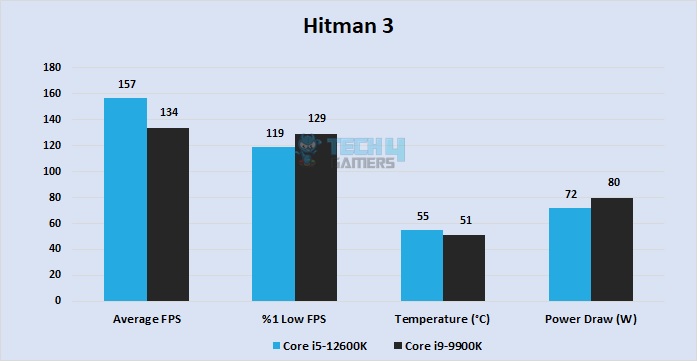
- In my first benchmark, I observed that the Intel Core i5 12600K was performing 16% better, with an average of 157 FPS, compared to the Intel Core i9-9900K, which was reaching 134 FPS on average.
- The %1 low FPS drops are also in favor of the Intel Core i5-12600K.
- Temperatures-wise, the i9-9900K takes the cake, averaging 51°C compared to 55°C of the i5-12600K.
- However, the Core i9-9900K also consumed 8 watts more power.
Cyberpunk 2077
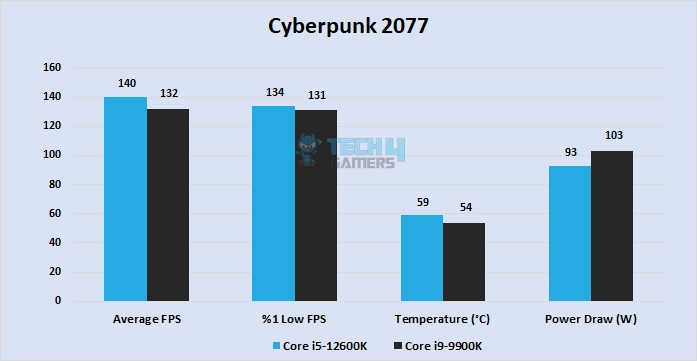
- In Cyberpunk 2077, the Intel Core i5 12600K (140 FPS) outputs a 6% higher average FPS than the Intel Core i9-9900K (132 FPS).
- Lastly, the Intel Core i5-12600K also beat the Intel Core i9-9900K in the 1% low FPS drops.
- Here, my findings showed that the Core i5-12600K ran 5°C warmer than the i9-9900K on average.
- The i5-12600K consumed 93 watts, while the i9-9900K consumed 103 watts of power, on average.
Battlefield V
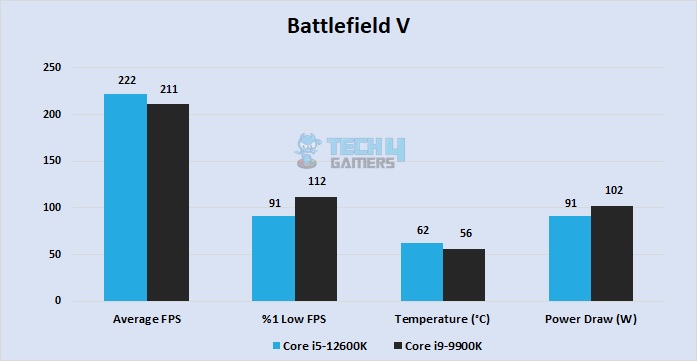
- Next up is Battlefield 5. Here, the Intel Core i9-9900K was output 211 FPS compared to the 222 FPS of the Intel Core i5-12600K.
- The Intel Core i9-9900K (112 FPS) beat the Core i5-12600K (91 FPS) in the area of 1% low FPS drops.
- Regarding temperatures, the i5-12600K’s average stood at 62°C compared to 56°C of the i9-9900K
- As for the power consumption, the Core i5-12600K stood out, consuming 9 watts less.
Forza Horizon 5
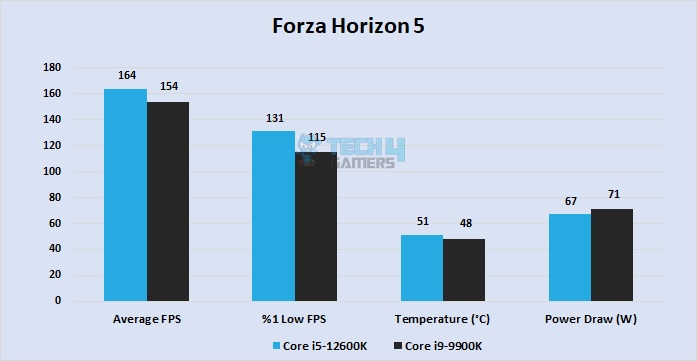
- My Forza Horizon 5 benchmark showed that the Intel Core i5-12600K was 9% faster than the Intel Core i9-9900K in average FPS.
- Additionally, the Core i5-12600K scored 131 FPS compared to 115 FPS of the i9-9900K, as far as the %1 lows are concerned.
- The i9-9900K continued to impress in thermal performance, running at just 48C on average.
- But, it also consumed 4 watts more than the i5-12600K.
Mafia Definitive Edition
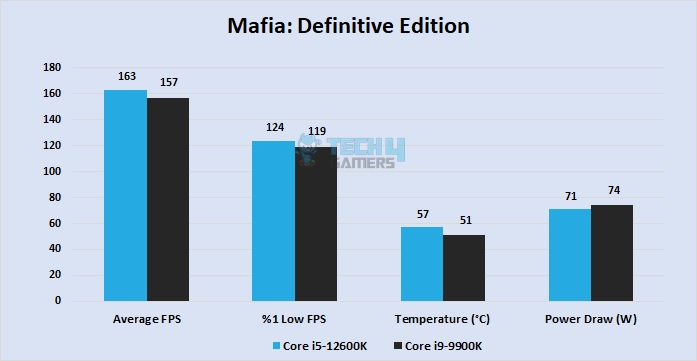
- The Intel Core i5 12600K scored 163 average FPS, proving 4% faster than the i9-9900K, which scored 157 FPS.
- As for the 1% low FPS, the i5-12600K fell to 124 FPS in reply to 119 FPS of the Intel i9-9900K.
- The Core i5-12600K displayed 11.7% worse thermal performance here, as per my results.
- Power consumption is on the (marginally) higher side for the i9-9900K CPU again, at 74 watts.
Death Stranding
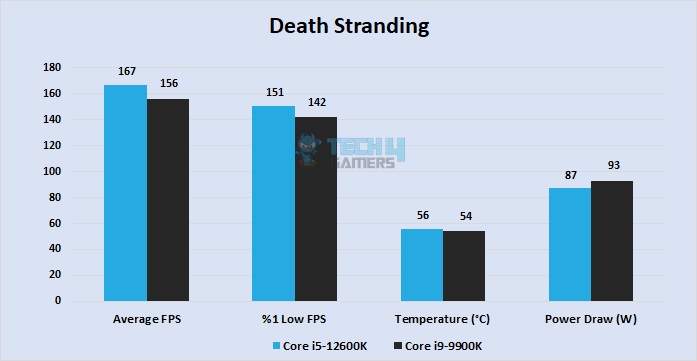
- In Death Stranding, I recorded the i5-12600K, scoring 167 FPS on average, outscoring the i9-9900K yet again.
- Observing the %1 low FPS from my benchmark, the i5-12600K scored 151 FPS in reply to 142 FPS of its Coffee Lake rival.
- Temperatures-wise, there was only a 2C difference between the two competing CPUs this time around.
- The i5-12600K consumed 87 watts of power on average. In contrast, the Core i9-9900K used 93 watts.
Microsoft Flight Simulator
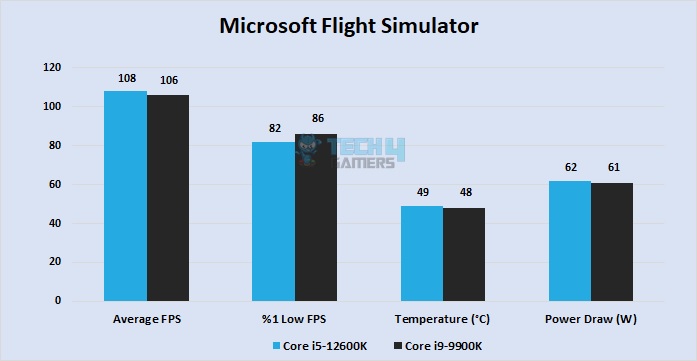
- In my Microsoft Flight Simulator test, the Intel Core i5-12600K won in average FPS again, but the margin was less than 2%.
- The Intel Core i9 9900K took the lead when it came to the %1 low FPS, accumulating 86 FPS.
- The temperature figures also showed little contrast between the two CPUs, with the i5-12600K running 1C warmer on average.
- Moreover, I only found a 1-watt difference in the two CPUs’ average power consumption in this benchmark.
The Witcher 3: Wild Hunt
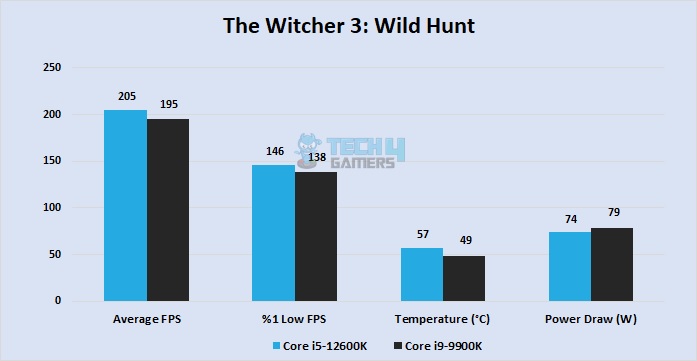
- From this benchmark, I observed an average 5% increase in FPS from the Intel Core i5-12600K (205 FPS) over the Intel Core i9-9900K (195 FPS).
- Concerning the %1 low FPS, the i5-12600K still racked up 146 FPS, leading the i9-9900K by 5.7%.
- According to my testing, the i5-12600K averaged 57C in this test, while the i9-9900K remained just under the 50C mark.
- As for power draw, the i5-12600K averaged 74 watts of consumption in contrast with the 79 watts of the i9-9900K.
Overall Gaming Performance
What do the overall gaming performance figures look like for the two CPUs? Let’s take a look.
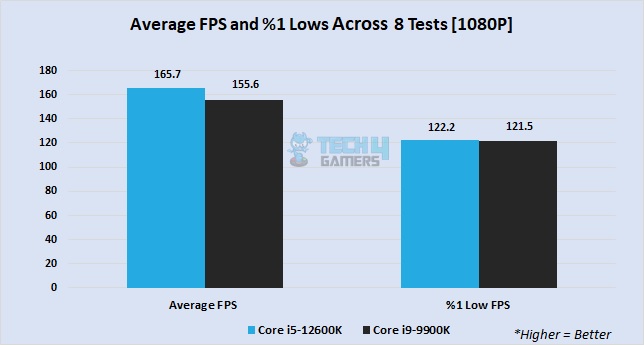
- Across my eight benchmarks, the Core i5-12600K averaged 165.7 FPS compared to 155.6 FPS of the i9-9900K. Thus, the Core i5-12600K is about 6.4% faster than the Core i9-9900K in 1080P gaming.
- As for the %1 low FPS, the two CPUs differed by less than 1%, with my results favoring the i5-12600K.
Average Power Consumption
I’ve also averaged the power consumption numbers from the eight benchmarks.
Reminder:
- Core i5-12600K TDP: 125W (base), 150W (boost)
- Core i9-9900K TDP: 95W (base), 119W (boost)
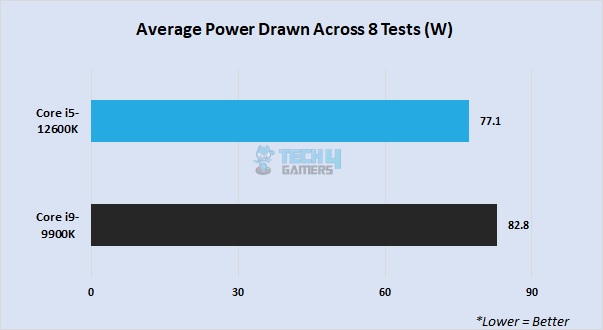
- The i5-12600K’s average power consumption was 77.1 watts, whereas that of the i9-9900K was 82.8 watts. Thus, the Core i9-9900K consumes about 7.3% more power than the Core i5-12600K in 1080P gaming.
Thermal Performance
Finally, a look at the temperature figures from the eight benchmarks.
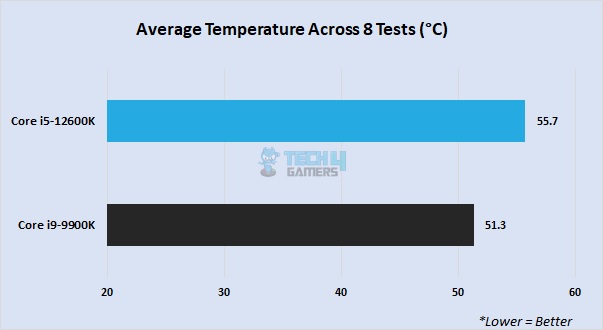
- As per my findings, the i5-12600K averaged 55.7°C across the seven tests. In comparison, the i9-9900K remained cooler at 51.3°C. Specifically, in 1080P gaming, the Core i9-9900K runs about 8.5% cooler than the Core i5-12600K.
Similar Article: Guide: CPU Temperature While Gaming
CPU And Electricity Costs
As of October 2023, the i5-12600K is still in production, while the i9-9900K was discontinued in 2020. Now, the i5-12600K has fallen in price since Intel’s Raptor Lake CPUs launched and can be found for as little as $209. On the other hand, the Core i9-9900K can be purchased second-hand for about $280. This signifies a 33.9% price difference between the two CPUs, making the i5-12600K much cheaper.
Also, the electricity costs should be kept in mind for both CPUs. In my benchmarks, the i9-9900K consumed slightly more power, but in more intensive tasks, the i5-12600K is bound to use more power as it has higher TDP ratings.
Which One Would I Recommend?
You’ve reached the end of this CPU comparison, but if you’re still double-minded, here’s my recommendation on which CPU to choose.
- Performance: The i5-12600K outperformed the i9-9900K in 1080P gaming.
- Pricing: The i5-12600K is available at a lower cost than a used i9-9900K, making it a more budget-friendly option.
- Latest Technology: The i5-12600K offers support for PCIe 5.0 and DDR5 memory while still being compatible with DDR4 memory. It also features an LGA1700 socket, which is extended to the 14th-generation CPU lineup, ensuring future upgrade compatibility with just a BIOS update.
- Thermal and Power Efficiency: Although the i5-12600K may run slightly warmer and consume a bit more power during intensive tasks, these differences are manageable with a good aftermarket CPU cooler and are unlikely to significantly impact your electricity bill.
| CPU | Pros | Cons |
|---|---|---|
| Core i5-12600K |
|
|
| Core i9-9900K |
|
|
Thank you! Please share your positive feedback. 🔋
How could we improve this post? Please Help us. 😔
Feedback By:
[Comparisons Expert]
Abdemanaf is a skilled creative writer who has been honing his craft since 2011. While initially working in different fields, he found a passion for technology and has been exploring the tech world since early 2015. Over the years, he has developed an in-depth knowledge of the latest tech trends and product offerings by various companies.
Abdemanaf’s writing reflects his analytical mindset and ability to think critically. He has a knack for breaking down complex technical information into easily digestible pieces, making his articles engaging and accessible to readers from all backgrounds. In February 2022, he joined Tech4Gamers as a blog and product comparison writer, where he has been able to hone his skills further.
As a writer, Abdemanaf is dedicated to staying up-to-date with the latest technological advancements and trends, enabling him to provide readers with the most relevant and accurate information. He is always eager to learn more and is constantly seeking new challenges to improve his skills.
Get In Touch: manaf@tech4gamers.com


 Threads
Threads